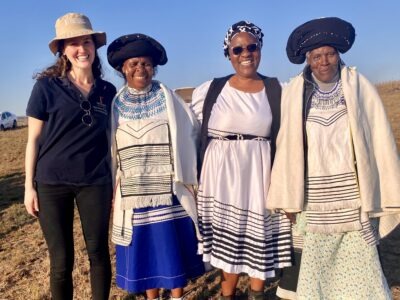Ethiopia is the birthplace and Africa’s largest producer of Arabica coffee. With over 80 percent of Ethiopia dependent on agriculture, and 20 percent of the country’s population involved in the coffee value chain, the opportunities for investment and development impact are substantial in combating poverty and driving economic growth.
Investing in Ethiopian Coffee
The future of Ethiopian coffee is now taking shape. New initiatives are modernizing agriculture and promoting sustainable development. ACDI/VOCA recently hosted in Washington, D.C., officials from the Ethiopian Commodity Exchange and the Ethiopian Ministry of Agriculture to discuss the future of agribusiness in Ethiopia and opportunities for partnership and investment.
CEO of Ethiopia Commodity Exchange (ECX) Ermias Eshetu and Ethiopia Ministry of Agriculture’s Keberu Belaynu offered their expert opinions during the interactive session of various stakeholders. USAID Agricultural Growth Program-Agribusiness and Market Development (AGP-AMDe) Director Vanessa Adams moderated.
“There is tremendous opportunity to invest in Ethiopia,” said Eshetu.
Eshetu shared how inroads have been made in establishing more transparent pricing and transactions between farmers and transporters, helping to provide farmers with the opportunity to make an “intelligent decision to decide if they should sell or not.” If a price is low, the farmers will hold onto their crop longer to earn more money.

Ethiopia Ministry of Agriculture Representative and Agricultural Growth Program Lead Keberu Belaynu shares his thoughts on Ethiopia’s coffee industry.
Evolution in Ethiopian Coffee Value Chain
ECX has matured since its establishment, enabling the Ethiopian coffee value chain to fill in much-needed gaps. It has helped enable standardization of coffee as a commodity as well as price transparency and market visibility.
The typical Ethiopian smallholder farmer has a two- to three-hour walk to the market. A few have access to donkeys or cars to carry their product. Many are dependent on middle men who have trucks and may not offer an accurate market price to the farmer.
“Having a market like ECX meant we can at least disrupt the dynamics of [smallholders dependent on trucks]”, Eshetu said.
Feed the Future Impact in Ethiopia
The USAID AGP-AMDe in Ethiopia uses a value chain approach to strengthen the agriculture sector, enhance access to finance, and stimulate innovation and private sector investment.
This flagship program is part of the presidential Feed the Future initiative, which harmonizes hunger- and poverty-fighting efforts in countries with chronic food insecurity and insufficient staple crop production. AMDe, pronounced ahmd, means “pillar of my home” in Amharic, signaling the project’s importance to household well-being.
“The [AGP-AMDe] program is comprehensive in addressing the whole value chain,” Belaynu said.
Successes include the first-ever fertilizer building plant in Ethiopia built for a farmer cooperative union with an investment of $1.2 million. AMDe has supported 553,867 project participants in six value chains in Ethiopia and has leveraged more than $12.7 million in investments.
SCAA 2015 Event
This event hosted by AGP-AMDe and ACDI/VOCA followed the recent Specialty Coffee Association of America (SCAA) annual event in Seattle, April 9–12. The event is a milestone event in the worldwide specialty coffee industry.
At the event, a delegation of 80 representatives of Ethiopian coffee stakeholders and experts presented about investment opportunities and the unique characteristics of the country as this year’s SCAA portrait country.







